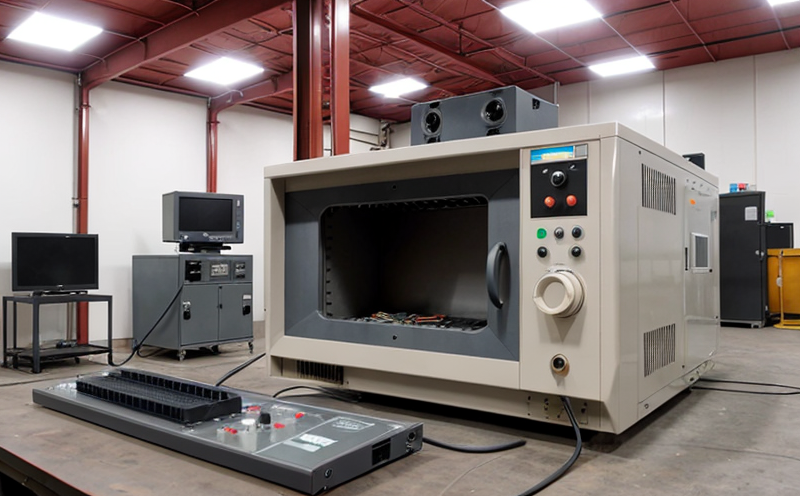ANSI C63 4 EMC Testing for Commercial Electronics
The ANSI/IEEE Standard C63.4-1987 (Reaffirmed 2005) defines the procedures and criteria to measure electromagnetic compatibility (EMC) of commercial electronics devices, systems, and components. This standard is critical in ensuring that electronic products do not interfere with other electronic devices or systems and are themselves protected from interference.
In the context of industrial and commercial electronics testing, ANSI C63 4 EMC Testing ensures that products meet stringent electromagnetic compatibility requirements as defined by international standards like IEC 61000. This service is particularly important for manufacturers aiming to comply with regulatory requirements and achieve reliable performance in various environments.
The test procedures outlined in ANSI C63.4 are designed to evaluate the immunity of equipment from conducted and radiated electromagnetic interference, as well as its own emissions. This comprehensive testing ensures that products operate safely and without disruption, which is essential for maintaining quality standards across diverse applications such as telecommunications, medical devices, automotive electronics, and more.
At our laboratory, we employ state-of-the-art equipment to conduct these tests, ensuring precision and accuracy in evaluating the EMC performance of your commercial electronic products. Our team of experts ensures that every step from specimen preparation to final reporting adheres strictly to ANSI C63.4 guidelines.
The importance of this testing cannot be overstated, especially given the increasing complexity of modern electronics and the potential for electromagnetic interference (EMI) to cause significant operational issues. By adhering to ANSI C63 4 standards, we help our clients achieve robust and reliable products that can perform consistently across a wide range of environments.
Our rigorous testing process involves several key steps. Initially, we carefully prepare the specimens for testing according to the specified criteria in ANSI C63.4. Once prepared, the devices undergo thorough environmental stress tests under controlled conditions. This includes exposure to electromagnetic fields and other potential sources of interference. The results are meticulously recorded and analyzed to ensure compliance with the standard.
The equipment used in these tests is calibrated and maintained according to strict protocols to guarantee accurate measurements. We use high-quality instrumentation, such as spectrum analyzers, network analyzers, and EMI chambers, which are essential for capturing precise data on emissions and immunity levels. The test results provide detailed insights into the EMC performance of the devices, highlighting any areas that may need improvement.
Upon completion of the tests, we issue comprehensive reports detailing the findings. These reports include both quantitative data and qualitative assessments, offering a clear picture of the device's electromagnetic compatibility. This information is invaluable for manufacturers looking to enhance product quality and ensure regulatory compliance.
Why It Matters
The importance of ANSI C63 4 EMC Testing extends beyond mere compliance; it plays a crucial role in ensuring the reliability, safety, and performance of commercial electronic devices. In environments where multiple electronic systems are present, interference can lead to malfunctions or even complete system failure. By adhering to this standard, manufacturers can mitigate these risks and ensure that their products operate seamlessly alongside other devices.
In addition to preventing operational disruptions, ANSI C63 4 EMC Testing also helps protect sensitive electronics from damage caused by electromagnetic interference. This is particularly important in industries where downtime can result in significant financial losses or even safety hazards. By conducting rigorous tests according to this standard, we provide peace of mind for our clients and their customers.
The demand for reliable electronic products continues to grow across various sectors, including healthcare, automotive, aviation, and consumer electronics. As these devices become more interconnected, the risk of electromagnetic interference also increases. ANSI C63 4 EMC Testing ensures that each device can function independently without causing or being affected by interference from other systems.
By investing in this testing early in the product development cycle, manufacturers can identify potential issues and address them before production begins. This proactive approach not only reduces costs associated with rework but also enhances brand reputation and customer trust.
Applied Standards
| Standard Name | Description |
|---|---|
| ANSI/IEEE C63.4-1987 (Reaffirmed 2005) | Defines the procedures and criteria for measuring electromagnetic compatibility of commercial electronics. |
| IEC 61000 | A series of international standards addressing EMC issues in electronic systems. |
| EN 301 489-1 | European standard for the measurement and limitation of radio disturbance characteristics from digital apparatus. |
The ANSI/IEEE C63.4-1987 (Reaffirmed 2005) is the cornerstone of our testing procedures, ensuring that all devices meet stringent EMC requirements. We also reference IEC 61000 and EN 301 489-1 to provide a holistic approach to EMC evaluation.
Customer Impact and Satisfaction
- Enhanced Product Reliability: Ensures that products perform consistently across various environments, reducing the risk of failure due to electromagnetic interference.
- Promotes Compliance with Regulations: Helps manufacturers meet regulatory requirements for EMC performance in different regions.
- Bridges Industry Gaps: By adhering to ANSI C63.4 and other relevant standards, we address the specific challenges faced by commercial electronics manufacturers.
- Maintains Quality Standards: Our testing process ensures that products meet high-quality benchmarks, enhancing customer satisfaction and brand reputation.
- Prediction of Potential Issues: Early identification of potential problems through rigorous testing allows for timely corrections before production.
- Increases Efficiency: By avoiding costly rework due to non-compliance issues, we help streamline the product development process.
Our commitment to providing accurate and reliable EMC testing has earned us a reputation for excellence among our clients. Their satisfaction is reflected in the consistent positive feedback they provide regarding our services.





